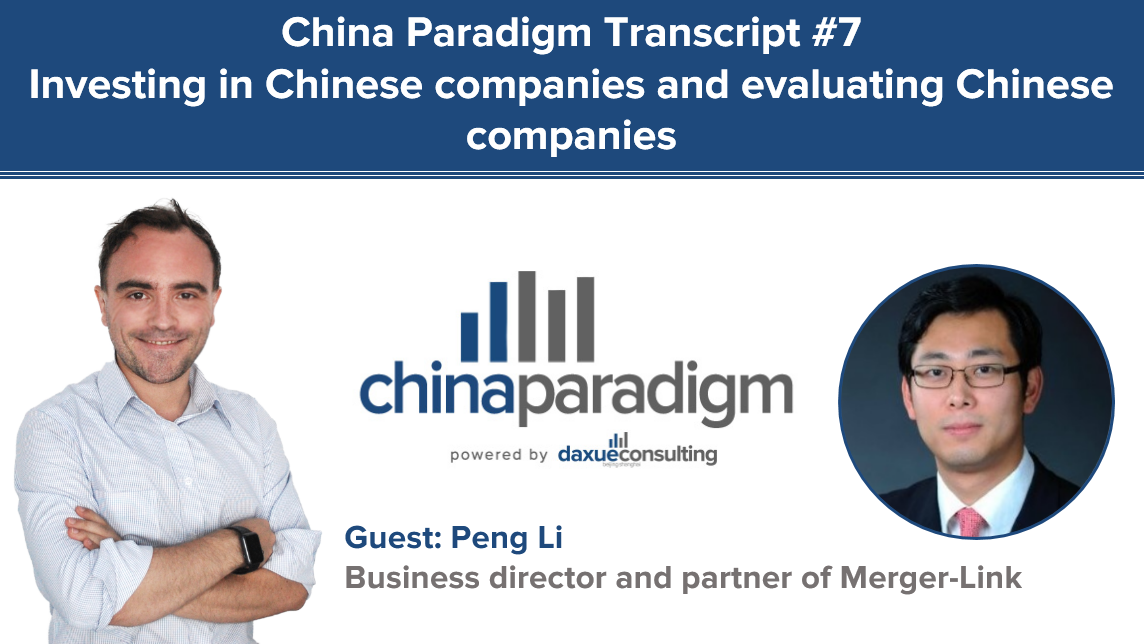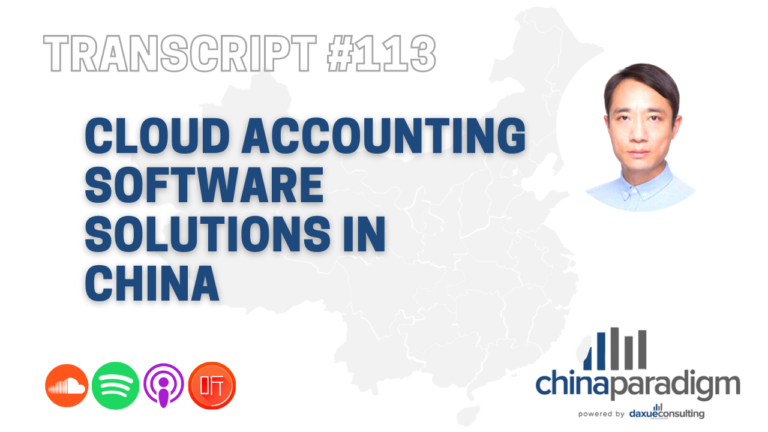This transcript is based on our interview with Peng Li, a China investment specialist and founder of Merger-Link. Li focuses on earmarking suitable medium-sized businesses for investment by western institutions. Investing in Chinese companies, particularly mid-sized ones can be potentially troublesome for western investors. This is where Merger-Link can provide value.
Listen to the full China Paradigm #7 episode on Youtube, Apple Podcast, Spotify, Soundcloud, or simply soak in the knowledge from the transcript below.
Here is the transcript from our conversation with China investment specialist, Peng Li
We first met Peng Li 4 or 5 years ago, he was introduced as a person who sold a business for more than 40 million dollars. Having worked in finance in China for 13 years, Li had a lot of insights on investing in and evaluating Chinese companies. Now he has his own business, which operates in China as an SaaS model, providing information about non-corporate companies to investors. Clients include private equity companies or corporations wanting to buy in China.
Li worked in investment banking for more than 10 years in London and China. Merger-Link provides business intelligence services to these investment banks as a service (SaaS). The value they create is that they generate, collect, and structure proprietary info and sell that data to private equity funds, investment banks, MNCs, and other organizations looking to invest in China.
We are excited to talk about how Merger-Link’s software works, also the situation of M&A in China and more.
Could you give us an idea of the size of Merger-Link?
Peng Li: We are a SaaS business in China but actually we charge on an annual rather than monthly basis. Our portfolio has around 50 clients, mostly global private equity funds, Chinese venture capital funds, and also some MNCs. We launched the SaaS platform around a year ago, and have about 20 employees. Merger-Link is the only company in the Chinese market providing this service right now so we are growing very rapidly.
What is the difference between Merger-Link and other companies like Wind, Bloomberg, Capital IQ that are also providing financial info through software?
Well companies like Wind and Bloomberg mostly provide information on the secondary or stock market, whereas we provide info on the primary market. Capital IQ is an interesting tool where you can check information on private companies. The main difference between us and those companies is that we concentrate solely on evaluating Chinese companies and we only focus on proprietary intelligence. So, the data we have on our platform cannot be found on any other platform. Every piece of info we have is proprietary. We look more at middle sized companies although we also have proprietary info on some listed companies.
What is your pricing model?
All clients will pay a subscription fee and then if they want some consultation services from us with regard to purchasing an asset and if the deal goes through successfully then we will receive a referral or finder’s fee too.
The cost depends on lots of things like if the client pays a higher subscription fee the referral fee will be lower and vice versa. Also, it depends on how active the investors are. If a client is only looking to be involved in investments which are unlikely to go through more than once a year, then we will look for a higher upfront fee.
Different contracts will be drawn up for every client but all of our clients pay a subscription fee because we want to make sure they are committed to and serious about investing in Chinese companies.
How do you prevent potential clients from skipping you and going straight to the companies they want to invest in?
Merger-Link positions itself as an outsource partner for these investing institutions. Investing in Chinese companies is not easy even for private equity firms with big budgets. The time and effort it would take for our clients to evaluate middle-sized Chinese companies may not be worth it.
Also, there may be issues for these investors when it comes to communicating and drafting SPAs with the Chinese companies that they want to invest in. We are a business development tool that does this part of the job for them and that allows them to concentrate more on the areas that enable them to add more value to their business. Also, after they have dealt with us once or twice, they will begin to trust us to represent them because they simply cannot go to every deal, the volume is too high because we facilitate thousands of deals every year.
There are too many middle-market (5–500 million RMB turnover per year) companies in China for our clients to focus on with real clarity because the market is not as developed and transparent as it might be in the West. Recently, we saw that there are around 30–40,000 private companies in China with around 10 million net income every year. Our service is definitely going to cost less than it would cost for these investment institutes to hire one or two analysts when investing in Chinese companies and even with a team of analysts they could still only do a fraction of the analysis that we do in terms of evaluating Chinese companies.
When your clients are investing in Chinese companies, how do they screen companies?
Clients can search for companies they want to invest in by a variety of different factors using our tool. There are six main factors they can use to get rid of the companies they would not be interested in and ensure they are investing in Chinese companies that are right for them.
When it comes to M&A, how do you evaluate Chinese companies? When evaluating Chinese companies do you use the same sources as they use in the West? What are differences?
I think the main differences are that Chinese firms are much more overvalued, that is because they have much stronger growth than companies in the West and people will jump on the bandwagon, also ordinary Chinese investors are much more likely to invest in private Chinese companies rather than Western companies because the biggest companies are state-owned and cannot be invested in. Also, there are only 4,000 publicly listed Chinese companies and they are growing quickly so they are attracting massive investment. So, there is a lack of investment options in China. Also, because the market is quite inflated, business owners are often unwilling to sell because they will look at their competitors’ values and feel that they are being undervalued when compared with other market players.
This transcript is a sample of our China Paradigm podcast interview with Peng Li, Business Director and Partner at Merger-Link. To continue learning about investment and company valuation in China, find the full episode on Youtube, Soundcloud, Apple Podcast, and Spotify.





